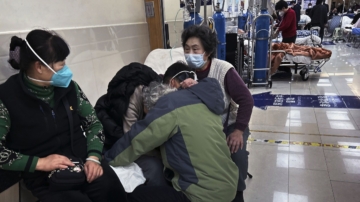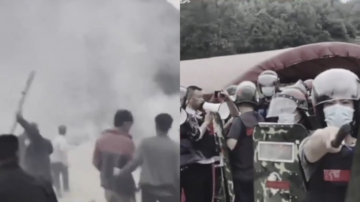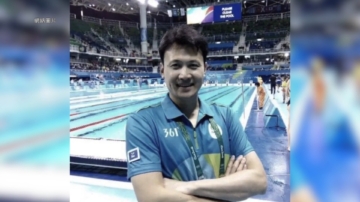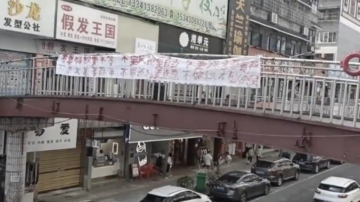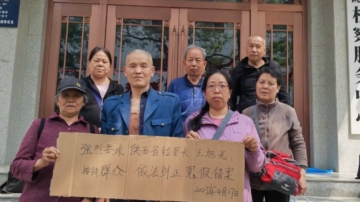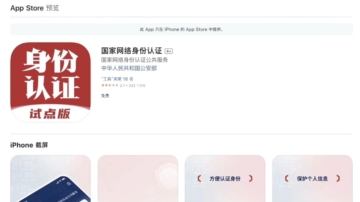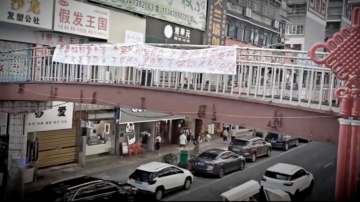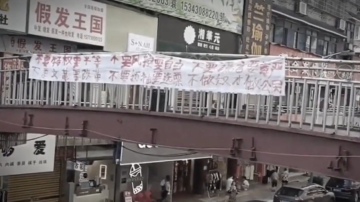【新唐人2014年09月23日讯】上海着名律师郑恩宠20号告诉新唐人,经过一番斗智,他在9月19号,向中纪委驻上海巡视组举报了市委书记韩正。不仅去巡视组的路上,有两名警察贴身跟随,连中央巡视组的工作人员一开始也拒绝接受郑恩宠的举报,那他是怎么举报成功的呢?请看报导。
郑恩宠律师说,在中央巡视组7月末刚刚抵达上海的时候,律师界、民主党派和工商联的朋友就给他打电话,鼓励他向中央巡视组写投诉信,并表示,愿意帮助他将信送交巡视组。之后,朋友们又反馈说,巡视组对他的举报信比较重视,建议他亲自去巡视组一趟,以证明材料的真实性。
于是,郑恩宠律师决定,在19号前往中央巡视组上海办公地点江苏路888号。由于家门口有12名警察和保安,24小时轮流看管,郑恩宠对看管人员谎称,要去父母小区派出所办理迁移户口的手续,才得以出门。
等到了巡视组驻地附近,郑恩宠才告诉贴身跟随的两名警察,他想去中央巡视组,顺便交一封举报信。
上海律师郑恩宠:“他说你举报谁?我说举报韩正。他说,唉呦,这个事情别告诉我,我装不知道。当时我就催他打电话。我说从保护你的角度出发,你应该请示他,允许不允许我到巡视组。当时我做了思想准备。你通知国保处以后,你拦住我最好来警车,来警车把我传唤,我做好思想准备了,今天可能出‘大新闻’了。我到中央巡视组去,你上海故意把警车拉掉。”
但是,国保处似乎并不想制造拦截上海居民向中央巡视组举报的“大新闻”。郑恩宠说,国保处在电话里指示警察说,“既然到了,那就算了”。
于是,郑恩宠走进了江苏路888号。在填写表格的时候,郑恩宠开门见山写道,控告中共中央政治局委员、上海市委书记韩正,从2003年6月5号出狱后,一直对自己实施软禁,至今已经八年零三个月了。
郑恩宠描述,接待他的是一名60多岁,工号018的男子,看起来接待上访者非常熟练。但是,当看到控告上海市委书记韩正的内容,018号工作人员马上一愣。
郑恩宠:“他的眼睛很凶的看着我,‘你告韩正啊?你有证据吗?’我说我怎么没有证据?他说你告韩正要负责的。‘我当然负责。’‘你有甚么证据?’我说我没有证据我就不来了。”
之后,018号工作人员又说,举报韩正,他需要审查。
郑恩宠:“我说你审查甚么事情啊?你们报纸头版头条、一百多个版面说,中央巡视组是主要接受举报、接受投诉,是查中共上海市委书记主要负责人的事情,那么韩正是一号人物,我今天路子是对的。”
郑恩宠说,018号工作人员仍然想找藉口,拒绝接受举报。但自己灵机一动说,这封投诉信,巡视组早就收到了。
郑恩宠:“我看他表情一愣,我说我是通过人大代表,民主党派人士和律师界的人大代表,他们帮助我把投诉信送到你们巡视组了。甚至我平时大量对韩正的揭发,上海领导人的揭发,我有的直接寄给中纪委,你去查就可以了。这时候他开始好像重视起来了,他遇到我这样推不掉的老对手了。”
至此,018号工作人员才让身边的助手接过郑恩宠的两页举报信,编号并扫瞄输入电脑。
当天,郑恩宠10点回到家,警车已经到了,闸北区公安局的史金荣、张晓明对郑恩宠宣布,从今天开始禁止他出门,因为他今天欺骗了警察,擅自去中央巡视组。
不过郑恩宠说,自己反问,“假如我讲清楚,你还会批吗?”对方说:“我当然不批。”
之前在8月10号,郑恩宠因为接受外媒采访,透露要向巡视组写举报信,第二天就遭到抄家。
采访编辑/秦雪 后制/李勇
Zheng Enchong Was Blocked by Police
when He Wanted to Blow the Whistle on Han Zheng
Sept. 20—A famous Shanghai lawyer, Zheng Enchong
told NTD that he blew the whistle on Han Zheng on Sept. 19
by reporting him to the Discipline Inspection Commission
in Shanghai, after a battle of wits.
Han Zheng is the current head of the Communist Party
China Shanghai Municipal Committee.
On his way to the Inspection Commission, two police officers
closely monitored Zheng Enchong and the inspection team
refused to accept his whistle-blowing materials at first;
so how did Zheng Enchong succeed?—Here’s the coverage.
Zheng Enchong says that in July, when the inspection team
had just arrived in Shanghai, his friend lawyers, democratic
parties and federations all rang him, encouraging him
to write an appeal letter to the Inspection Commission.
His friends said they could help him deliver the letter
and gave details that would boost the chances of the team
paying attention to his appeal; also suggesting that Zheng
personally go to the office to prove the letter’s authenticity.
So on Sept. 19, Zheng Enchong visited the inspection office
located at 888 Jiangsu Road, Changning, Shanghai.
Zheng’s home was being monitored by twelve policemen
and was under 24-hour watch, so in order to go out, he said
he needed to go to a police station for his parents,
to help with formalities to change their registered address.
When Zheng got close to the inspection office, he told
the two police officers following him that he wanted to
hand over one appeal letter to the central inspection team.
Lawyer, Zheng Enchong: "The police asked me,
who do you want to blow the whistle on?"
"I said, 'Han Zheng'; he said, 'Come on, don't tell me that,
I'll pretend not to know'—so I told him to ring his boss."
"I said, 'from the point of view of protecting yourself,
you should consult your boss and find out if I am allowed
to visit the inspection team.'"
"I prepared myself mentally and continued, 'After notifying
your boss at the National Security Office, you'd better
stop me and force me into the police car—I'm prepared;
the story may make today's breaking news."
The National Security Department didn't want such news
of officers stopping a Shanghai resident from appealing.
Zheng Enchong says, the boss instructed the police to
"ignore it, since he’s already arrived there."
So Zheng Enchong sued Han Zheng, a Politburo member
and the head of the Shanghai Municipal Committee.
Since his jail release on June 5, 2003, Zheng Enchong's been
under house arrest from Han Zheng for over 8 years.
Zheng says when he entered the office to submit the letter,
an officer with the role number 018 met with him, who was
over 60 years old and experienced in handling petitioners,
but he was shocked at seeing the target being Han Zheng.
Zheng Enchong: "His eyes faced me ferociously and he said,
'You're suing Han Zheng?—Do you have evidence?’"
"I said, 'yes I have', and he told me I had to be responsible
for my charge, so I said, 'I am certainly responsible.'"
"He continued, 'What sort of evidence do you have?'
—so I replied, 'if I had no evidence, I wouldn't come.'"
The officer said that he would first review it,
then accept the charge.
Zheng Enchong: "I said, 'what you need to review?
—the official newspapers' first-page headlines and over
a hundred pages have all said the inspection teams are here
to receive charges and appeals, and will investigate issues
related to the main leaders in Shanghai; well Han Zheng is
the top man, and what I am doing today is correct."
Zheng Enchong says the officer was still looking for an excuse
to refuse his appeal.
Zheng Enchong: "He was surprised—I said, 'I delivered this
appeal via the National People's Congress representatives,
who are members of democratic parties and lawyers
and they helped me'; he then began to pay attention."
"I submitted a large number of whistle-blowing materials
on Han Zheng and other main Shanghai officials, directly
to the Central Discipline and Inspection Commission."
The officer let his two assistants take Zheng Enchong's
two-page appeal letter, who then numbered and scanned it.
As Zheng Enchong returned home at 10 o'clock that night,
a police car arrived, and Shi Jinrong and Zhang Xiaoming
from the Zhabei District Public Security Bureau got out
to tell him that from now on, he was banned from going out,
because he had lied to the monitoring officers today
and had visited the inspection team without approval.
Zheng Enchong asked, "If I would have told you, would you
have let me go?"—to which they said, "certainly not."
On Aug. 11, police had raided Zheng Enchong's home after
he disclosed in an interview with foreign media a day earlier
that he would write an appeal letter to the inspection team.
Interview & Edit/QinXue Post-Production/LiYong
郑恩宠律师说,在中央巡视组7月末刚刚抵达上海的时候,律师界、民主党派和工商联的朋友就给他打电话,鼓励他向中央巡视组写投诉信,并表示,愿意帮助他将信送交巡视组。之后,朋友们又反馈说,巡视组对他的举报信比较重视,建议他亲自去巡视组一趟,以证明材料的真实性。
于是,郑恩宠律师决定,在19号前往中央巡视组上海办公地点江苏路888号。由于家门口有12名警察和保安,24小时轮流看管,郑恩宠对看管人员谎称,要去父母小区派出所办理迁移户口的手续,才得以出门。
等到了巡视组驻地附近,郑恩宠才告诉贴身跟随的两名警察,他想去中央巡视组,顺便交一封举报信。
上海律师郑恩宠:“他说你举报谁?我说举报韩正。他说,唉呦,这个事情别告诉我,我装不知道。当时我就催他打电话。我说从保护你的角度出发,你应该请示他,允许不允许我到巡视组。当时我做了思想准备。你通知国保处以后,你拦住我最好来警车,来警车把我传唤,我做好思想准备了,今天可能出‘大新闻’了。我到中央巡视组去,你上海故意把警车拉掉。”
但是,国保处似乎并不想制造拦截上海居民向中央巡视组举报的“大新闻”。郑恩宠说,国保处在电话里指示警察说,“既然到了,那就算了”。
于是,郑恩宠走进了江苏路888号。在填写表格的时候,郑恩宠开门见山写道,控告中共中央政治局委员、上海市委书记韩正,从2003年6月5号出狱后,一直对自己实施软禁,至今已经八年零三个月了。
郑恩宠描述,接待他的是一名60多岁,工号018的男子,看起来接待上访者非常熟练。但是,当看到控告上海市委书记韩正的内容,018号工作人员马上一愣。
郑恩宠:“他的眼睛很凶的看着我,‘你告韩正啊?你有证据吗?’我说我怎么没有证据?他说你告韩正要负责的。‘我当然负责。’‘你有甚么证据?’我说我没有证据我就不来了。”
之后,018号工作人员又说,举报韩正,他需要审查。
郑恩宠:“我说你审查甚么事情啊?你们报纸头版头条、一百多个版面说,中央巡视组是主要接受举报、接受投诉,是查中共上海市委书记主要负责人的事情,那么韩正是一号人物,我今天路子是对的。”
郑恩宠说,018号工作人员仍然想找藉口,拒绝接受举报。但自己灵机一动说,这封投诉信,巡视组早就收到了。
郑恩宠:“我看他表情一愣,我说我是通过人大代表,民主党派人士和律师界的人大代表,他们帮助我把投诉信送到你们巡视组了。甚至我平时大量对韩正的揭发,上海领导人的揭发,我有的直接寄给中纪委,你去查就可以了。这时候他开始好像重视起来了,他遇到我这样推不掉的老对手了。”
至此,018号工作人员才让身边的助手接过郑恩宠的两页举报信,编号并扫瞄输入电脑。
当天,郑恩宠10点回到家,警车已经到了,闸北区公安局的史金荣、张晓明对郑恩宠宣布,从今天开始禁止他出门,因为他今天欺骗了警察,擅自去中央巡视组。
不过郑恩宠说,自己反问,“假如我讲清楚,你还会批吗?”对方说:“我当然不批。”
之前在8月10号,郑恩宠因为接受外媒采访,透露要向巡视组写举报信,第二天就遭到抄家。
采访编辑/秦雪 后制/李勇
Zheng Enchong Was Blocked by Police
when He Wanted to Blow the Whistle on Han Zheng
Sept. 20—A famous Shanghai lawyer, Zheng Enchong
told NTD that he blew the whistle on Han Zheng on Sept. 19
by reporting him to the Discipline Inspection Commission
in Shanghai, after a battle of wits.
Han Zheng is the current head of the Communist Party
China Shanghai Municipal Committee.
On his way to the Inspection Commission, two police officers
closely monitored Zheng Enchong and the inspection team
refused to accept his whistle-blowing materials at first;
so how did Zheng Enchong succeed?—Here’s the coverage.
Zheng Enchong says that in July, when the inspection team
had just arrived in Shanghai, his friend lawyers, democratic
parties and federations all rang him, encouraging him
to write an appeal letter to the Inspection Commission.
His friends said they could help him deliver the letter
and gave details that would boost the chances of the team
paying attention to his appeal; also suggesting that Zheng
personally go to the office to prove the letter’s authenticity.
So on Sept. 19, Zheng Enchong visited the inspection office
located at 888 Jiangsu Road, Changning, Shanghai.
Zheng’s home was being monitored by twelve policemen
and was under 24-hour watch, so in order to go out, he said
he needed to go to a police station for his parents,
to help with formalities to change their registered address.
When Zheng got close to the inspection office, he told
the two police officers following him that he wanted to
hand over one appeal letter to the central inspection team.
Lawyer, Zheng Enchong: "The police asked me,
who do you want to blow the whistle on?"
"I said, 'Han Zheng'; he said, 'Come on, don't tell me that,
I'll pretend not to know'—so I told him to ring his boss."
"I said, 'from the point of view of protecting yourself,
you should consult your boss and find out if I am allowed
to visit the inspection team.'"
"I prepared myself mentally and continued, 'After notifying
your boss at the National Security Office, you'd better
stop me and force me into the police car—I'm prepared;
the story may make today's breaking news."
The National Security Department didn't want such news
of officers stopping a Shanghai resident from appealing.
Zheng Enchong says, the boss instructed the police to
"ignore it, since he’s already arrived there."
So Zheng Enchong sued Han Zheng, a Politburo member
and the head of the Shanghai Municipal Committee.
Since his jail release on June 5, 2003, Zheng Enchong's been
under house arrest from Han Zheng for over 8 years.
Zheng says when he entered the office to submit the letter,
an officer with the role number 018 met with him, who was
over 60 years old and experienced in handling petitioners,
but he was shocked at seeing the target being Han Zheng.
Zheng Enchong: "His eyes faced me ferociously and he said,
'You're suing Han Zheng?—Do you have evidence?’"
"I said, 'yes I have', and he told me I had to be responsible
for my charge, so I said, 'I am certainly responsible.'"
"He continued, 'What sort of evidence do you have?'
—so I replied, 'if I had no evidence, I wouldn't come.'"
The officer said that he would first review it,
then accept the charge.
Zheng Enchong: "I said, 'what you need to review?
—the official newspapers' first-page headlines and over
a hundred pages have all said the inspection teams are here
to receive charges and appeals, and will investigate issues
related to the main leaders in Shanghai; well Han Zheng is
the top man, and what I am doing today is correct."
Zheng Enchong says the officer was still looking for an excuse
to refuse his appeal.
Zheng Enchong: "He was surprised—I said, 'I delivered this
appeal via the National People's Congress representatives,
who are members of democratic parties and lawyers
and they helped me'; he then began to pay attention."
"I submitted a large number of whistle-blowing materials
on Han Zheng and other main Shanghai officials, directly
to the Central Discipline and Inspection Commission."
The officer let his two assistants take Zheng Enchong's
two-page appeal letter, who then numbered and scanned it.
As Zheng Enchong returned home at 10 o'clock that night,
a police car arrived, and Shi Jinrong and Zhang Xiaoming
from the Zhabei District Public Security Bureau got out
to tell him that from now on, he was banned from going out,
because he had lied to the monitoring officers today
and had visited the inspection team without approval.
Zheng Enchong asked, "If I would have told you, would you
have let me go?"—to which they said, "certainly not."
On Aug. 11, police had raided Zheng Enchong's home after
he disclosed in an interview with foreign media a day earlier
that he would write an appeal letter to the inspection team.
Interview & Edit/QinXue Post-Production/LiYong

